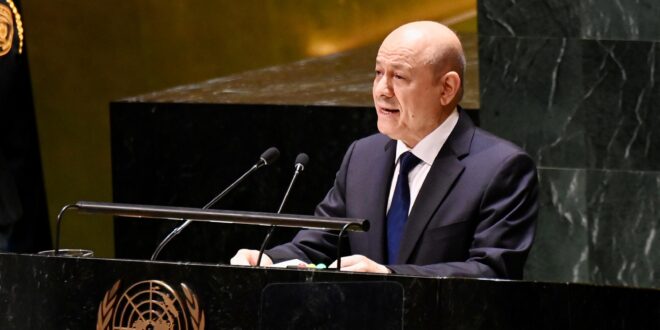New York – Saba
President Dr. Rashad Mohammed Al-Alimi, Chairman of the Presidential Leadership Council, has asserted that sustainable peace in Yemen must be based on the three terms of reference agreed upon nationally, regionally and internationally, and must ensure subjection to international laws, and the requirements of international peace and security, as stated in the Saudi initiative.
In a speech at the seventy-eighth session of the United Nations General Assembly in New York today, Thursday, the Chairman of the Presidential Leadership Council warned against any laxity on the part of the international community or neglect of the legal status of the state, or even dealing with the militias as a de facto authority, saying that this “will make the practice of repression, violating public freedoms is behavior that cannot be eliminated under any circumstances.”
The President indicated that with the resumption of the praiseworthy efforts of the brothers in the Kingdom of Saudi Arabia and the Sultanate of Oman, hopes are renewed for the Houthi militia to submit to the popular, regional and international will, and to recognize that the state guarantor of rights and freedoms, and the rule of law enforcement on the basis of justice and equal citizenship, is the only one that “will make… our country safer, more stable, and more respected in its regional and international surroundings.”
He stressed, “This is the logic of the legitimate government, and the ultimate goal of any efforts for sustainable peace, which must mean broad partnership without discrimination or exclusion, and the foundation for a brighter future.”
President Dr. Rashad Al-Alimi renewed the call for a firm international stance on the Yemeni file, saying, “The more the international community delays another year in presenting a firm stance, the more massive the losses will be, and the more dangerous the militias and terrorist groups will be in their cross-border threats, as well as their terrible violations of human rights around which our nations have united under the umbrella of this institution (the UN) for more than seventy years.”
He expressed his astonishment at the international community’s ignoring of the Houthi militias’ gross violations of human rights, including restrictions on travel, work, and women’s education, the suppression and kidnapping of journalists, and the crushing of those who oppose its extremist ideology.
In his speech, President Al-Alimi presented a picture of the current scene, and points of progress and failure in our country afflicted by the Houthi militia war supported by the Iranian regime, pointing to the efforts made by the Yemeni government over the past months, with the support of brothers and friends, to fulfill its inevitable obligations, despite the disastrous repercussions of the Houthi militia attacks on oil installations and removing them from export for a whole year.
He pointed out, on the other hand, that there are still many heavy entitlements that exceed the capabilities of the Yemeni government, with the dominance of the war economy fueled by militias, the influx of tens of thousands of illegal immigrants, and the effects of climate change that leave behind hundreds of victims annually and devastated agricultural lands.
In this context, he noted the generous support that the government received from the brothers in the Kingdom of Saudi Arabia through a financial grant worth one billion and two hundred million dollars in support of the state’s general budget, as well as humanitarian and development funds and pledges, from the brothers in the United Arab Emirates, friends in the United States of America, and the countries of the European Union, the United Kingdom, and other regional and international partners.
He welcomed the United Nations’ move towards moving the path of relief interventions to a development scope, but he stressed that this shift must include pumping international pledges and financing through the recognized Yemeni banking system, to strengthen the position of the national currency, curb inflation, and ensure that these financings do not fall into suspicion.
 Ministry of Foreign Affairs and Expatriates Official Web Site
Ministry of Foreign Affairs and Expatriates Official Web Site
